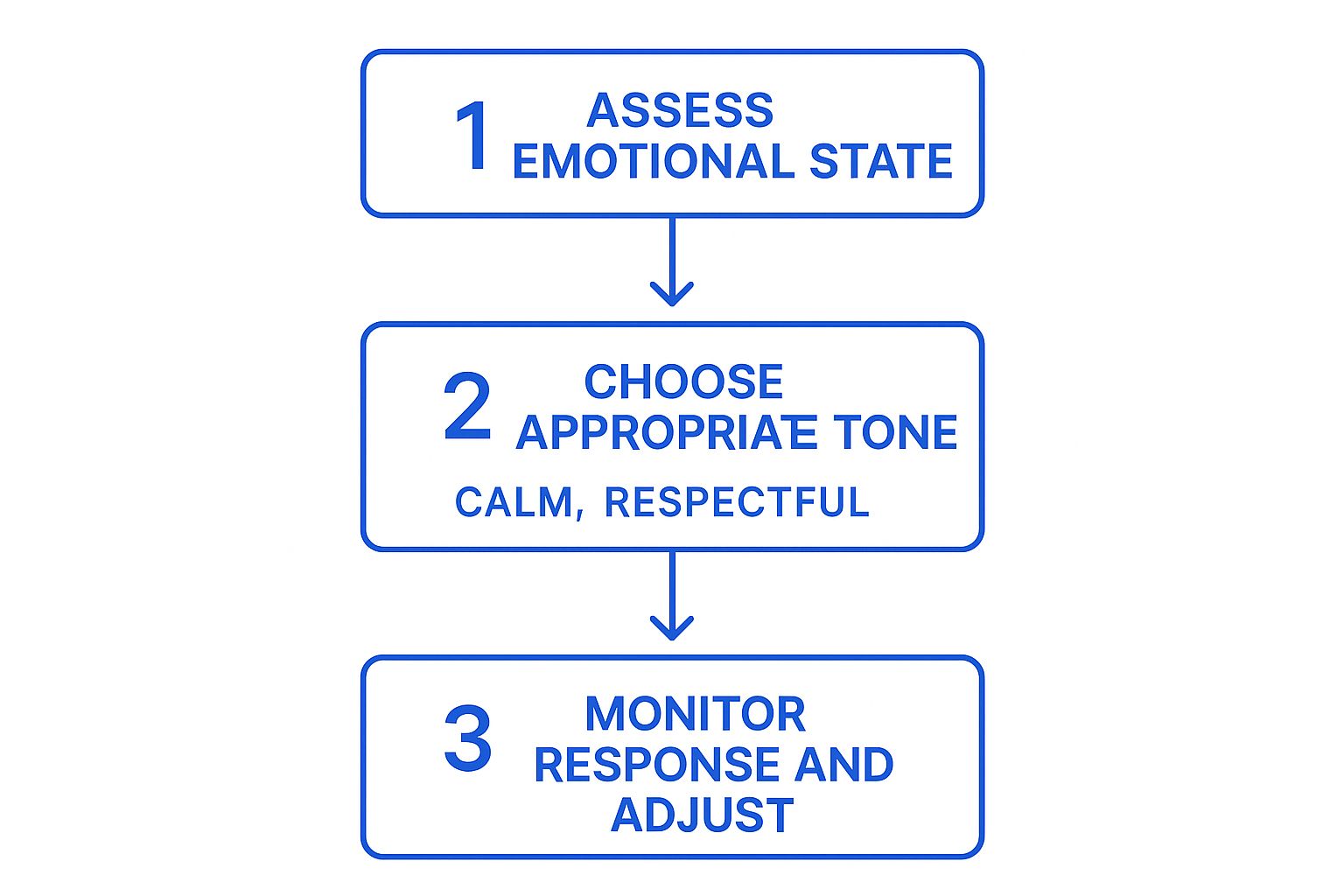Let’s be honest—the conversations you have with your parents aren’t the same as they used to be. The dynamic shifts over time, and talks that once felt effortless might now feel complicated or even emotionally loaded.
This isn’t about your relationship getting worse. It’s just a new chapter, one shaped by the realities of aging that can change how your parents process information, share their feelings, and connect with you.
Why Family Conversations Evolve
It's a new terrain for everyone. You might find yourself navigating conversations that are different because of a few key things:
- Health Challenges: Simple things like hearing loss, a bit of cognitive fog, or chronic pain can make it genuinely tough for a parent to keep up with a long or complex chat.
- Shifting Roles: Suddenly, you might be the one providing more support. This role reversal can feel strange and create new emotional dynamics for both you and your parents.
- Generational Gaps: Let's face it, your parents grew up in a different world. These differences in life experience can sometimes cause friction, especially when talking about modern life, technology, or money.
You might also notice you're talking less often. One study found that about 35% of adults with parents over 65 talk every day, a dip from the 42% who chat daily with younger parents. The phone is still the go-to tool, but knowing these patterns helps. You can learn more about these generational communication trends to get a clearer picture.
The first step is simply acknowledging that things have changed. It validates any frustration you might be feeling and opens the door to finding better, more compassionate ways to connect.
To get you started on the right foot, here are a few foundational tips you can put into practice right away.
Quick Tips for Better Conversations Today
This table breaks down some simple, foundational principles you can use to immediately improve your conversations.
| Principle | Actionable Tip |
|---|---|
| Practice Active Listening | Put down your phone. Give them your full attention. Repeat back what you hear them saying—something like, "Okay, so you're feeling worried about…" shows you're engaged. |
| Choose the Right Time | Don't bring up a serious topic when they're tired, distracted, or just walking in the door. Wait for a calm, quiet moment when you won't be rushed. |
| Lead with Empathy | Before jumping in with your own opinion, try to see it from their side. Acknowledging their feelings first makes them more open to hearing yours. |
| Focus on One Topic | Don't bombard them. Trying to solve everything at once is overwhelming. Stick to one subject to keep the discussion clear and productive. |
Making these small adjustments doesn't just lead to better outcomes; it strengthens your bond by showing your parents that you see them, you hear them, and you care.
Adapting How You Speak and Listen

True communication with our aging parents goes way beyond just being patient. To really connect, you have to make a conscious shift in how you talk and, more importantly, how you listen. It’s the small, practical changes that can turn a frustrating conversation into a moment of real trust.
One of the most effective things you can do is start using "I" statements. Instead of an accusatory phrase like, "You never listen to me about your medication," try framing it from your perspective. Something like, "I get worried when I’m not sure you’ve taken your medication on schedule," completely changes the tone. It expresses your feelings without assigning blame, opening the door for teamwork instead of defensiveness.
The words you pick are a huge part of the equation, but your non-verbal cues often say so much more.
Master Your Non-Verbal Cues
Your body language and the environment you’re in can either build a bridge or put up a wall. To create a supportive space for these important conversations:
- Get on Their Level: Make direct eye contact. If your parent is sitting, pull up a chair and sit with them. This simple act shows respect and helps them read your facial expressions, which is a big deal if they have trouble hearing.
- Offer a Gentle Touch: A hand on theirs or a reassuring pat on the shoulder can convey so much warmth and empathy. It grounds the conversation in love and care.
- Cut Out Distractions: Turn off the TV. Put your phone on silent and out of sight. Creating a quiet, focused space shows your parent that they have your full attention and that what they’re saying matters to you.
Remember, the goal is to make them feel heard and respected, not managed. Every interaction is an opportunity to preserve their dignity and reinforce that you are on their side, working together as a team.
For example, when you need to go over new instructions from a doctor, don’t just rattle off a list of complex medical terms. Break it down. You could say, “Let’s just focus on this one morning pill for now. It needs to be taken with breakfast.” Keep it simple and tackle one thing at a time.
For more resources and support for families, this NJ Caregiving guide is another great place to find helpful information.
How to Navigate Difficult Conversations
Let’s be honest: tackling tough subjects like finances, driving, or future health plans is often the hardest part of communicating with your parents as they get older. These conversations are so emotionally charged because they poke at sensitive themes—independence, mortality, and control.
The secret is to stop seeing them as confrontations. Instead, think of them as collaborative planning sessions. Your real goal is to show you’re on their side, working with them to honor their wishes and keep them safe.
So, instead of a blunt statement like, "You shouldn't be driving anymore," try framing it around their well-being.
You could say something like, "I get so worried when you're out driving in that heavy traffic. I'd love to explore some other transportation options with you so you can save your energy for the things you really enjoy."
This simple shift changes everything. You’re not taking something away; you’re adding support and peace of mind.
Setting the Stage for Success
The timing and setting for these chats are just as important as the words you use. Don't ambush your parents with a heavy topic right after a stressful day or, worse, during a holiday get-together. Find a calm, private moment when you both have the time and mental space to talk without pressure.
It’s also a smart move to break big topics into smaller, more manageable conversations. Trying to review a parent's entire financial history in one sitting is just overwhelming. A better approach might be to start with a simple chat about their long-term goals or just making sure their will is up to date. This makes the subject feel less like a massive, intimidating task and more like a normal part of life planning.
The guide below offers a simple, three-step emotional checklist to run through before you start the conversation.

It’s a great reminder to first check in with your own emotions, consciously choose a respectful tone, and then stay flexible enough to adjust based on how they react.
Acknowledge Cultural and Family Dynamics
How you approach these conversations will also be shaped by your family’s unique background and culture. These differences play a huge role in how families interact and care for their elders.
For instance, some family structures are built on close, frequent contact, while others prioritize different kinds of support. Understanding these dynamics within your own family is absolutely crucial for communicating respectfully. You can discover more about how family support varies across cultures to get a better sense of how it might influence your approach.
Understanding Generational and Gender Dynamics

Let’s talk about the unspoken rules. In many families, when it comes to caring for aging parents, there are often invisible lines drawn by generation and gender. It’s a subtle but powerful force that often dictates who does what.
You’ve probably seen it in action. Daughters frequently step into the role of hands-on emotional and practical support. Sons, on the other hand, might find themselves managing finances or logistical tasks. This isn't a knock on anyone; it's simply an observation of deeply ingrained roles that many of us grew up with. But these unwritten expectations can lead to real problems, creating an imbalance that leaves one sibling feeling overwhelmed and another feeling disconnected. A son might think he's pulling his weight by sorting out the bills, while his sister is drowning in the day-to-day emotional labor and feels completely alone.
Acknowledging these dynamics is the first step toward a more balanced approach. The goal isn't to assign blame but to open a dialogue about fairness and what truly helps your parents.
Rebalancing Caregiving Roles
This isn't just a feeling; the disparity in caregiving is backed by research. The impact of gender roles on family care is significant. One analysis found that daughters often provide as much care as they are physically and emotionally capable of giving, while sons tend to contribute a more defined, and often limited, amount. You can read more about the gender disparity in elder care and its effects. Over time, this imbalance can take a serious toll on the primary caregiver's well-being and even their financial stability.
To create a system that feels more fair and sustainable for everyone, your family needs to start having honest conversations. It might be awkward at first, but it's essential.
Here are a few ways to start rebalancing the load:
- Put It All on the Table: Create a master to-do list that includes everything—from doctor's appointments and medication management to grocery runs and simple companionship. Seeing the full scope of the work can be a real eye-opener for everyone.
- Play to Strengths, Not Stereotypes: Instead of defaulting to gendered roles, assign tasks based on who is best suited for them. Is your brother a whiz with spreadsheets and insurance paperwork? Perfect. Are you better at providing the patient, hands-on support your mom needs? That's your strength.
- Schedule Regular Family Meetings: Don't let this be a one-and-done conversation. Set up regular check-ins—weekly or bi-weekly—to talk about what’s working, what’s not, and how you can adjust the plan as your parents' needs inevitably change.
Overcoming Common Communication Roadblocks

Even when you have the best intentions, you’re bound to hit a few communication snags. It happens. These moments can be incredibly frustrating, but having a few practical solutions in your back pocket helps you navigate them with a lot more grace and a lot less friction.
Let's break down some of the most common challenges you might face.
Physical changes, especially hearing loss, are a huge one. In fact, about one-third of adults over 60 have some level of hearing trouble, which can make conversations feel isolating for them. The fix is often surprisingly simple: face them directly when you speak, say your words clearly (without shouting), and cut down on background noise by turning off the TV. This small adjustment ensures they can both hear you and see your facial expressions, which makes a world of difference for comprehension.
What about when you’re met with resistance, particularly around accepting help? I’ve seen this countless times. It’s almost never about you. It's usually rooted in a deep-seated fear of losing their independence. Instead of giving orders, try reframing your suggestions to give them a sense of control.
Rather than saying, “You need a walker,” you could try, “I was thinking a walker might make it easier to get out to the garden. What do you think?” This simple shift turns a command into a conversation, respecting their autonomy and dignity.
Navigating Memory and Cognitive Changes
When you're dealing with memory issues tied to cognitive decline, you’re in different territory. Patience is your single most important tool. You may have to repeat yourself, and the key is to do it calmly without letting your frustration show. Visual aids are also a fantastic way to reinforce what you’re saying.
Here are a few tools that can support your conversations:
- A large-print calendar to keep track of appointments and visits can be a reliable external memory booster.
- Simple written notes or a list on a small whiteboard can summarize the key takeaways from a conversation.
- Labeled photo albums are a wonderful, low-pressure way to connect and spark positive memories.
These strategies aren't just about getting your point across. They’re about showing compassionate support. For caregivers looking for more great resources, this helpful NJ Caregiving visual guide for families has some excellent tips. The real goal is to adapt your communication to meet them where they are, making sure they feel safe, heard, and understood.
Frequently Asked Questions
When you're caring for your parents, certain questions come up again and again. These conversations can be tough, but you're not alone in facing them. Here's some straightforward advice for navigating a few of the most common challenges we see.
How Do I Talk to My Parent Who Refuses Help?
It’s completely normal for a parent to resist help. They often see it as losing their independence, which can be scary. The key is to start by acknowledging and validating that feeling.
Instead of insisting, frame the help as a tool to keep their independence, not take it away. Try saying something like, “I was thinking if someone helped with the groceries, you’d have more energy for your garden.” This shifts the focus from what they're losing to what they're gaining. It gives them a choice, not a command.
The goal is to make them a partner in the decision. Introduce ideas gradually and always keep the conversation collaborative.
What Is the Best Way to Discuss Finances?
Money talk is always sensitive. The best approach is to frame it around planning and security, not control. Using "I" statements can make it feel less like an interrogation. For example, "I want to make sure we understand your wishes so we can honor them down the road."
Timing is everything. Don't bring it up during a stressful moment. A calm, quiet time is best. You can even soften the topic by mentioning your own financial planning first, making it feel like a normal family chat.
Patience and simplicity are vital. Speak slowly and clearly in a quiet environment. Use short, simple sentences and ask one question at a time to avoid overwhelming them.
If the conversation gets heated, don't push back or argue. It's better to gently change the subject or simply validate their frustration by saying, "I understand this is difficult to talk about." A warm smile or a gentle touch on the arm can also go a long way in providing reassurance. For more resources, you can check out information from the NJ Caregiving team.
At NJ Caregiving, we've helped countless families navigate these exact conversations. If you're looking for compassionate, professional support for your loved one in Mercer County, visit https://njcaregiving.com to see how our personalized in-home care services can bring you peace of mind.


